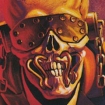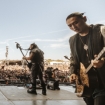As if being Iron Maiden's frontman — as well as an airline pilot, author, screenwriter, radio and TV personality, competitive fencer and all-around 21st century renaissance man — wasn't already impressive enough, Bruce Dickinson can now add "brewer" to his jam-packed resumé.
Since 2013, Iron Maiden and England's Robinsons Brewery have been collaborating on the creation of some truly excellent beers, with Dickinson — a staunch fan of traditional British ales — leading the charge. First came Trooper, a 4.7% ABV ESB-style bottled ale (4.8% if you get it pumped from the cask), followed by limited-edition releases Trooper 666 (a 6.6% ABV ESB) and Trooper Red 'n' Black (a 6.8% ABV English porter). This October, Maiden/Robinsons have released their latest collaboration: Hallowed, a limited-edition 6.0% Belgian-style ale, which marks a rare venture into the unpredictable world of Belgian yeasts for the venerable brewery, which hasn't changed the type of yeast used in its beers since 1942. Deliciously malty and delightfully aromatic, Hallowed — which features Maiden mascot "Eddie" on the label in monk's robes — will surely be swallowed with considerable relish by anyone who appreciates such classic Belgians as Leffe or Grimbergen.
But while Dickinson is himself a big fan of Belgian beers, the creation of Hallowed was at least partly motivated by something less pleasant — namely, the side-effects of the radiation treatments Dickinson underwent in 2015, when it was discovered that he had cancerous tumors on his neck and tongue. "When we designed Trooper, I had a fully functioning palate," he tells Revolver. "And then, I got cancer. And after all the radiation and all the chemo and all the nonsense, you go through a period in which your sense of taste disappears completely. You cannot taste anything; for example, I could eat custard and not taste a thing — but if it was vanilla custard, I could get the effect because of the smell. And I thought that was fascinating."
After having the same experience with beer — "It tastes like water, but you can smell it" — Dickinson became interested in adding a more aromatic beer to the Maiden/Robinsons roster. "I think the next frontier for beer, really, is a really wonderful smell," he explains. "I told Martyn Weeks, the master brewer at Robinsons, that I wanted to make a beer with no booze smell, and with a great, aromatic aftertaste that lingers."
While metal bands to teaming up with brewers to create limited-edition beers has become fairly common over the past decade, no such partnership has been as successful as that of Maiden and Robinsons. "This is not a gimmick, this is not a flash in the pan," says Dickinson. "Three and a half years down the line, we've sold 18 million pints. Something is definitely going on here, guys!" However, neither the band nor the brewery creating something this successful when they first met to discuss the possibility of a collaboration; in fact, as Dickinson explains, the whole thing kind of got rolling by accident, after an unnamed marketing company approached the band about making an Iron Maiden wine.
"They came to us and said, 'Look, we'd be interested in you guys doing a red wine,'" Dickinson recalls. "And we went, 'Uh? Why would we be interested in doing a red wine?' And they said, 'Well, you'll be able to put your label on it and sell lots of bottles. Hey, look, the Scorpions did one, and Motörhead did one!' But we were like, 'Well, yeah, but that's not really who we are, even though we love red wine and we drink it. That's not Maiden, really. But I tell you what — maybe we should do a beer, because that is who we are!'
"So they took that to mean, 'Oh, let's just put a [Iron Maiden] label on somebody else's beer.' And I went, 'No, no, mate, you don't understand. If we're going to do a beer, let's actually design a beer!' At that point, we kind of parted company with the marketing company, but we thought, 'That's not a bad idea, actually — let's get in touch with some likely candidates who might want to brew a beer with us!'"
Robinsons, a family-run regional brewery founded in 1849 and headquartered in the Greater Manchester area, was one of the breweries on the band's short list. "They fit the profile," says Dickinson. "We didn't want to go to one of the big chains, the big brewers, because we'd just get eaten alive, and they wouldn't be interested in doing anything with any credibility."
But when the band reached out to Robinsons, the brewery wasn't overly enthusiastic about the idea of a collaboration. "They were sort of interested," Dickinson laughs. "They didn't exactly knock us over in a stampede." Instead, the brewery put Dickinson through an "audition" process involving a blind taste test with a dozen different beers — and as with his audition for Maiden back in 1981, Dickinson passed with flying colors.
"They asked me for a hit list of some of my favorite beers, so I gave them a list of about half a dozen beers I liked," Dickinson explains, "and then they came down to London with a dozen anonymous bottles. They asked me to taste them all, and rate them, what I liked and what I didn't like, things like that. And then I named a few of the beers — 'I think that's Wadworth 6X, that's definitely Fuller's ESB, and I think that one's Green King Abbot Ale' — and apparently, I was pretty much spot-on. I was like, 'Wow, that was pretty good!'
"So then we sat down with some hops," he continues, "and we had a big hop-sniffing session with various hop teas, and had a good chew on various different malts which had been toasted to various different degrees. And then we started talking about how the beer should feel in the mouth, and how much alcohol it should have. At which point Martyn Weeks, the master brewer, said, 'I've got a pretty good idea now. I know what kind of beers you like. Let me go away and make a couple of brews.'"

Weeks soon came up with a test brew that clicked with Dickinson's palate, and Trooper was born. The beer was an immediate success, with over 5 million pints sold in its first year, and it earned a gold metal in the 2014 British Bottlers' Institute Competition. Inspired by its reception, and by the brewing process in general, Dickinson began coming up with new ideas for Robinsons. "Martyn and I struck up a beer-based relationship, and I started coming to him and saying things like, 'Let's raise the ABV to 6.6, and see what happens. What effect does that have on the flavor profile, and that sort of thing?' And that's where we got Trooper 666, which was actually quite a minor hit, especially amongst people that wanted something in a bottle that had a bigger kick to it. And then I ran with the idea of, 'Let's produce a whole roster of beers, and we'll roll them out.'
"The next one we did was the imperial stout, the Red 'n' Black, which I am really pleased about. I have to say I am not the greatest drinker of stouts, and I thought, 'Well, how do I make a stout that's drinkable to someone who doesn't like stouts?' So I approached Red and Black from that perspective: Let's go for an everyman stout! The best thing I can hope for with Red and Black is somebody goes, 'Oh, I don't normally drink this.' But then they drink it and they go, 'Hey! I could drink that! That's great!' And every single beer I do with Robinson's, I want it to have that effect on somebody that doesn't normally drink that beer. Like with Hallowed, somebody says, 'I don't normally drink strong Belgian lagers — I just drink Carlsberg,' or whatever. But then they drink it and go, 'Oooh, yeah, that's lovely!'"
While Hallowed was initially created as a limited-edition beer — and it's currently listed as being available only until January — Dickinson says that he and Robinsons have been in talks to make it a regular part of their roster. And while Trooper has proven incredibly popular in Britain, he feels that Hallowed actually might catch on in the U.S. (where Belgian beers are incredibly popular) to a degree that Trooper has yet to achieve on this side of the pond.
"It's time to do a bit of a 'hearts and minds' campaign in America now, in the same way we did in the U.K.," he says. "I think we've come a long way, in terms of credibility, and we've got a great bunch onside now with our U.S. distributors [Artisinal Imports], because they absolutely get where we need to be with the beer. And if Hallowed turns into a massive success in America, which I think it could do, then it will drag Trooper up by the bootstraps, as well."
In an era where it's not uncommon to see smaller beers and breweries gobbled up by larger corporations — à la Heineken's recent buy-out of Lagunitas — it seems fair to ask Dickinson if he envisions eventually aligning Maiden's brews with a company that would have a far greater reach and brewing capacity than Robinsons and its various distributors. Dickinson, however, seems completely opposed to the idea.
"This is one of my beefs," he says. "You've got these great brands, these great beers, that originally were from small breweries with fantastic output — and then they get taken over by a big brewery, and then they just flag out and license the production of the beer, and it becomes kind of anodyne, and it tastes a little bit like what it used to, but it's quite clearly lost all of its character.
"One of my favorite beers of recent years was a beer called Doom Bar," he continues. "I went on holiday in Cornwall about 15, 16 years ago, and discovered Doom Bar there. I went, 'Wow! What a cracking beer!' I loaded up my Landover with a few crates of it from Sharp's, the brewery, and I drove back home to London. And then, all of a sudden, I saw Doom Bar in a pub in London — and I thought, 'Wow! Doom Bar on draft!' I got like the last half-pint before they ran out, and I went, 'Yeah, it was as good as I remembered it. Wow!' It was cropping up in pubs left, right and center ... and then they sold out to Coors. And now Doom Bar is made by Coors, and it just sucks," he laughs. "It's just not the same, I'm sorry. And as a result, I stopped seeing it; all of a sudden, people stopped drinking it so much. They've gone off it because it just doesn't have the right taste profile anymore.
"So it's a lesson learned, there. People go, 'Oh, would you ever brew Trooper somewhere else?' Logistically, financially — yes, it would make sense for those reasons. However, taste-wise, it makes no sense; the only place you can brew Trooper is at Robinson's. That's where Trooper gets brewed, that's the taste profile, and anything else is never going to be the same."








